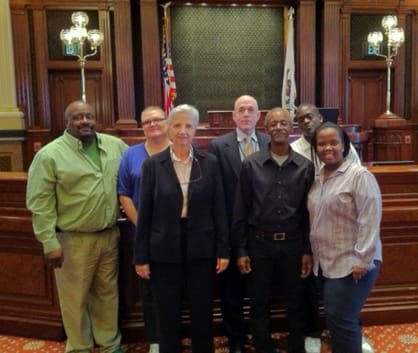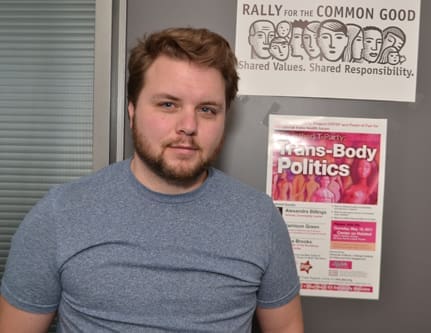Chris Wade has a powerful voice.
As a member of the Illinois Alliance for Sound AIDS Policy, a group convened by the AIDS Foundation of Chicago (AFC), Chris traveled to Springfield to participate in Lobby Days on May 8. AFC organized 40 individuals from the state’s northern and central regions to urge lawmakers to continue funding HIV care and supportive services; however, Wade was in a unique position.
In the rotunda of the capitol building, Illinois human care organizations near and far addressed a ruckus crowd of roughly 300 supporters.
Met with flashbulbs and chants of “Social service is our right,” Wade stood behind a podium and shared his story.
He told the crowd that he was homeless, addicted to drugs and alcohol, and HIV positive, but thanks to substance use treatment facilities, supported by funds from the state HIV funding line—well, I’ll let him tell the story. His speech is a powerful and needs to be experienced firsthand.
After Wade spoke, all 40 Lobby Day advocates sought out their elected officials in the House and Senate and discussed the importance of funding HIV/AIDS care and supportive services in this year’s budget (FY14).
In March, Governor Pat Quinn released a proposed $36 billion budget that would reduce state HIV/AIDS funding by $4.3 million, or 16 percent. Since 2011, Illinois has reduced state HIV funding by $9 million, or 30 percent.
If Quinn’s budget passes through the General Assembly, total state HIV spending would drop from $26 million in FY13 to $21 million in FY14. AFC has learned from sources at the Illinois Department of Public Health that the funding cut would center on the AIDS Drug Assistance Program (ADAP), which provides life-saving medications to people with the disease.
Though the Affordable Care Act will be in full swing next year, providing people with HIV more options for health care, the transition from ADAP to new programs will likely take time. Given that a continuum of care is vital for people with HIV, the state could see thousands of vulnerable individuals fall through the cracks if supportive services are eliminated—services that help people stay linked into care.
“HIV is a communicable disease,” said Ramon Gardenhire, AFC’s director of government relations. “When people with HIV receive continuous clinical care, treatment, and other essential services, the risk for transmission substantially decreases. Breaking this continuum puts a lot of lives at stake”—a risk AFC and its 40 Lobby Day advocates are working hard to avoid.
That’s why AFC will return to Springfield on May 22 to conclude its Lobby Day tour. That group will consist of activists from the southern half of Illinois.
If you’re interested in advocating for responsible HIV/AIDS funding but live outside this geographic area, you can still heed Wade’s words and “ask state leaders to do the right thing and support adequate funding for HIV care and services.”
Sign this petition  to protect health services for people with HIV, and return it to Lucy Baglin, AFC’s policy coordinator, by Friday, May 24. Email your completed form to [email protected] or fax it to 312-922-2916.
to protect health services for people with HIV, and return it to Lucy Baglin, AFC’s policy coordinator, by Friday, May 24. Email your completed form to [email protected] or fax it to 312-922-2916.
This simple act is a bold move in solidarity. Together, we can educate our elected officials about the importance of supporting health services for people with HIV/AIDS, especially as we transition to new programs under the Affordable Care Act.



